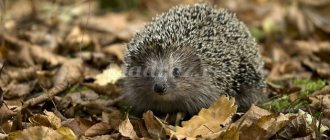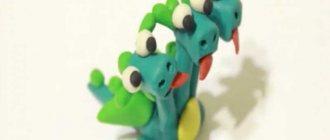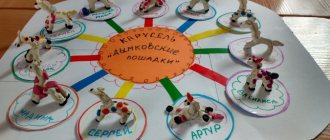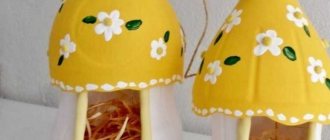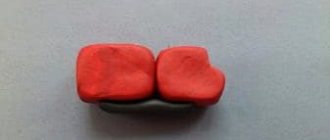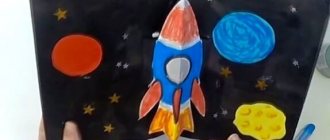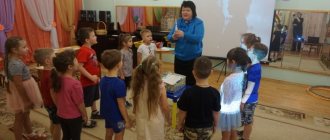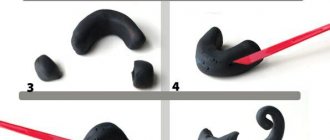Modeling on the theme “Space” with preschool children : a step-by-step master class on making a plasticine picture on the theme of space.
On April 12 we will celebrate Cosmonautics Day. Today, for this day, we will make an amazingly beautiful plasticine picture with the children on the theme “Space”.
Children of senior preschool and primary school age can make this plasticine picture about space themselves. And younger children can help them.
On the topic: methodological developments, presentations and notes
[] Purpose: To form an emotional response to a work of art “poster”. To develop the ability to create posters - and...
The use of non-traditional drawing techniques to develop fine motor skills of the fingers in children with general speech underdevelopment...
Summary of direct educational activities in the educational field “Artistic and Aesthetic Development” in the 2nd junior group “Snowman”. (using an unconventional drawing technique - the poking method)
With the help of this summary, you can introduce children to an unconventional drawing technique - the poking method. Dry brush painting...
Summary of direct educational activities in the educational field “Artistic and Aesthetic Development” (Musical Activities) in the vocal circle “Merry Notes” (general developmental group for children 5-7 years old)
“Give children more and more general, human, world content, but mainly try to introduce them to this through native and national phenomena.” V. G. Belinsky Nowadays it is very relevant about...
Summary of direct educational activities in the educational field: “Artistic and aesthetic development” with children of the graduating group with intellectual disabilities Type: productive activity (drawing) topic: “Bear in the forest”
Program content: continue to develop a positive attitude towards drawing in children. Teach children to paint over an image of an animal (bear) along the contour using the “poke” method (an unconventional technique...
Summary of direct educational activities in the educational field “Artistic and Aesthetic Development”. Artistic work “Christmas tree decorations”
Synopsis of educational activities in the educational field “Artistic and Aesthetic Development”. Artistic work “Christmas tree decorations”…
Tatyana Drevnova
For Cosmonautics Day. Modeling lesson in the senior group “This unknown planet”
Modeling
.
This unknown planet
.
Encourage children to create multi-figure plot compositions. Develop the ability to use familiar sculpting
: rolling, pulling, pressing, pinching, smoothing. Continue to develop children's interest in collective forms of activity. To develop artistic creativity, imagination, and fantasy in children.
Preliminary work.
Looking at posters on the topic “ Space”
"
, set of postcards "First in the World"
Reading literature on the topic " Space
"
: Y. K. Golovanov “The Road to the
Cosmodrome ”
, O. A. Skorolupova “Conquest
of Space ”
, V. L. Gorkov Yu. F. Avdeev “
Space ABC ”
Carrying out the intellectual game “Journey to distant planets”
»
Looking at the starry sky in the evening
Construction of
spaceships
, satellites, etc. Lego
Material:
Plasticine (12 colors)
Modeling
board (20*20 cm)
Wet wipes
Cardboard (30*30 cm)
How to sculpt a painting “Space” with children: step-by-step description
Step 1. Sculpt the planets.
- Combine small pieces of blue and white plasticine and roll into a ball.
Step 2
Flatten the ball, place it in the upper right corner and stretch it with your fingers, creating a fourth part of the circle. This will be one of the planets - planet Earth.
Step 3
- Similarly, combine several colors of plasticine into one lump: green, blue, brown.
- Roll the piece into a ball.
- Flatten the ball and stretch it with your fingers along the cardboard in the opposite, lower left corner, also creating a quarter circle. This will be, for example, the planet Pluto.
Step 4. Making a rocket
Roll out a piece of blue plasticine into a thin sausage.
Step 5.
Place the resulting sausage in a spiral so that the top of the rocket is sharp and the bottom is widened.
Step 6.
— Attach the resulting rocket blank to the planet Pluto.
— Roll out a piece of red plasticine into a thin sausage.
— Fold it into loops and attach the tail under the rocket.
Step 7
We sculpt an astronaut in a spacesuit
- Roll pieces of white plasticine into balls: the largest one for the body, smaller ones for the head, even smaller two balls for the legs, two balls for the arms and the same size for the feet, and two smallest ones for the mittens.
- Slightly flatten the balls for the head and mittens.
- Roll out the remaining balls lightly into sausages. Flatten them into ovals and attach them to cardboard as shown in the photo.
Step 8. We sculpt small details for a plasticine painting on the theme “Space”.
- Roll out a thin sausage from blue plasticine.
- Pinch off small pieces from the sausage and attach one on your head, imitating a mask on a spacesuit helmet. Stick the remaining plucked pieces at the places where the parts connect to each other.
— Attach the remaining rolled sausage to the rocket. This is a cable connecting the astronaut to the rocket.
Roll small pieces of red plasticine into a ball, flatten them and attach the portholes to the rocket.
Step 9. Sculpt the satellite
- Roll pieces of black and yellow plasticine into a ball.
— Roll the balls into small sausages and flatten them into oval cakes
— Connect the cakes together so that the bottom black cake peeks out slightly from under the top.
– Roll out a piece of yellow plasticine into a thin sausage.
- Pinch off small pieces from it and attach them to the yellow cake on top. Thus, we received 6 satellite antennas.
- Roll six small white pieces into a ball and attach them to the satellite antennas.
Step 10. Sculpt the planets Mars and Saturn
- Roll a blue piece of plasticine into a ball, flatten it slightly and attach a red sausage to it - this is the planet Saturn. Attach it to cardboard.
- Roll pieces of white and red plasticine into a ball. This is the planet Jupiter. Flatten the ball slightly and attach it to the cardboard.
- For the planet Mars, combine red and purple plasticine, roll the pieces into a ball and, similarly to the previous planets, attach the planet Mars to the cardboard.
This is such a beautiful picture!
Step 11. Sculpting stars in space
Pinch off small pieces of white, red, orange plasticine. Roll them into small balls, flatten them into flat cakes and attach them to cardboard. These are stars.
Get a NEW FREE AUDIO COURSE WITH GAME APPLICATION
“Speech development from 0 to 7 years: what is important to know and what to do. Cheat sheet for parents"
Click on or on the course cover below for a free subscription
NGO Artistic and Aesthetic Development
Topic: Travel into space. Modeling "Space"
Goal: consolidate initial ideas about space. To develop children's thinking, interest in understanding the world around them, imagination and creativity in modeling; cultivate a caring attitude towards the earth.
Progress:
Guys, we have received a letter, it is written by Lisa Barboskina (the hero of the famous animated series “Barboskina”), she is very upset, because her brother Druzhok wants to become an astronaut and fly into space, but she does not know who an astronaut is and what can be used to fly there .
Guys, do you know who an astronaut is?
That's right, this is a man who flew into space.
What was the name of the first person who flew into space? (Yuri Gagarin).
Did Yuri Gagarin fly into space by plane, helicopter or hot air balloon? (on a spaceship).
What did he see in space? (stars, planets, moon, sun).
Do you want to fly into space?
The guys I know also dreamed of flying into space and their dream came true. Look what is needed for this and what they saw there.
I suggest you become astronauts.
Game “Cosmonaut” (Space music sounds)
I want to become an astronaut! (hands on belt)
I put on a spacesuit (imitation of dressing)
I'll fly on a rocket (raise your arms up and connect above your head)
And I will open all the planets (make a big circle with your hands).
The spaceship has windows. What are their names? (portholes).
I give big rings to the children.
Imagine that you are in space and looking out the windows, what do you see? (stars, moon, sun, planets, earth).
What color is space? Is it light or dark there?
The astronauts have very difficult conditions on the ship. They feel overloaded and weightless.
I suggest playing “zero gravity”.
Astronauts swim in a ship (imitation of swimming with their hands).
Jump as high as possible. While you are in the air, you do not feel your body. When you go down the elevator, you can also feel weightlessness, jumping on a trampoline.
Game “What should we take with us on a flight” (with a ball, in a circle)
Guys, Lisa Barboskina is very worried and worried about her brother Druzhka, how can we calm her down, show her how interesting it is in space, how beautiful it is?
I propose to make a painting “Space” from plasticine.
I invite you to the table.
Demonstration: we make a carrot from plasticine - this is the basis of a rocket, we use beans for portholes, using a thin sausage we make fire for a rocket, etc.
Children exhibit their works at an exhibition for their parents.
– Guys, did you like today’s adventure?
What do you think, if there were no such wonderful professions as astronaut, astronomer, would people know so much about space?
Internet materials were used
Practical work:
Showing publications 1-10 of 135. All sections | Space. Modeling classes, plasticine
Photo report in the middle group “ Plasticineography”
» A rocket flies into
space
» The technique
of plasticine printing
is available to children from early preschool age. It allows you to quickly achieve the desired result and introduces a certain novelty into children’s creativity, making it more exciting...
Integration of OO: “Social and communicative development”, “Cognitive development”, “Speech development”, “Artistic and aesthetic development”. Objectives: - expand children’s understanding of the world around them ( space
)
; - to make children want to create the image of a rocket using technology...
